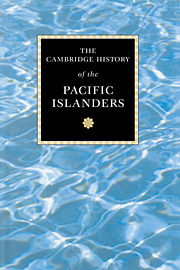Book contents
- Frontmatter
- Part One The Pacific To 1941
- Part Two The Pacific Since 1941
- 9 The War in the Pacific
- 10 A Nuclear Pacific
- 11 The Material World Remade
- 12 The Ideological World Remade
- 13 The End of Insularity
- Abbreviations
- Glossary
- Bibliography
- Index
- Map
- Map 17: Maximum expansion of Japanese control
- References
10 - A Nuclear Pacific
from Part Two - The Pacific Since 1941
Published online by Cambridge University Press: 28 March 2008
- Frontmatter
- Part One The Pacific To 1941
- Part Two The Pacific Since 1941
- 9 The War in the Pacific
- 10 A Nuclear Pacific
- 11 The Material World Remade
- 12 The Ideological World Remade
- 13 The End of Insularity
- Abbreviations
- Glossary
- Bibliography
- Index
- Map
- Map 17: Maximum expansion of Japanese control
- References
Summary
THE DAWN OF THE NUCLEAR AGE
When the atomic bomb ended the war in the Pacific, President Harry Truman noted in his diary: ‘It is a good thing that Hitler’s crowd or Stalin’s did not discover this atomic bomb.’ Truman’s satisfaction was brief. For a few years the United States alone possessed the technology; then the Soviet Union, Britain and France also armed themselves with nuclear weapons. The Soviets tested their bombs, however contaminating, within their own borders. The Americans, British and French resorted to distant colonies where populations were sparse and the political costs minimal. Several Pacific Islands met these criteria: Bikini and Enewetak atolls in the Marshall Islands for the United States, Christmas and Malden in the Northern Line Islands for Britain, and Moruroa and Fangataufa atolls in the Tuamotu Archipelago for France.
The nuclear history of the Pacific begins with two central facts. The test sites were on Islands remote from Western population, and Islanders were politically subordinated to the nuclear powers. To these colonial sites Britain added remote islands and desert country in Australia, made available by a government which was eager to help and little concerned about the consequences for Aboriginal people. At different times and in different places, nuclear devices were tested almost continuously from 1946 to 1996. The Americans conducted atmospheric tests of atomic (and later hydrogen) bombs in the Marshall Islands between 1946 and 1958, paused, then returned to the Pacific for a final series at Johnston Atoll and Christmas Island in 1962.
- Type
- Chapter
- Information
- The Cambridge History of the Pacific Islanders , pp. 324 - 358Publisher: Cambridge University PressPrint publication year: 1997
References
- 5
- Cited by



